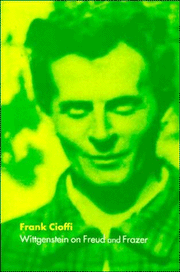Book contents
- Frontmatter
- Contents
- Acknowledgements
- Introduction: Wittgenstein on explanation and self-clarification
- 1 Information, contemplation and social life
- 2 Aesthetic explanation and aesthetic perplexity
- 3 Wittgenstein and the Fire-festivals
- 4 When do empirical methods by-pass ‘the problems which trouble us’?
- 5 Explanation, self-clarification and solace
- 6 Wittgenstein on making homeopathic magic clear
- 7 Wittgenstein and obscurantism
- 8 Wittgenstein on Freud's ‘abominable mess’
- 9 Congenital transcendentalism and ‘the loneliness which is the truth about things’
- AFTERWORD
- Index
1 - Information, contemplation and social life
Published online by Cambridge University Press: 05 January 2010
- Frontmatter
- Contents
- Acknowledgements
- Introduction: Wittgenstein on explanation and self-clarification
- 1 Information, contemplation and social life
- 2 Aesthetic explanation and aesthetic perplexity
- 3 Wittgenstein and the Fire-festivals
- 4 When do empirical methods by-pass ‘the problems which trouble us’?
- 5 Explanation, self-clarification and solace
- 6 Wittgenstein on making homeopathic magic clear
- 7 Wittgenstein and obscurantism
- 8 Wittgenstein on Freud's ‘abominable mess’
- 9 Congenital transcendentalism and ‘the loneliness which is the truth about things’
- AFTERWORD
- Index
Summary
Wittgenstein has a remark in which he admonishes us to remember that not everything which is expressed in the language of information belongs to the language game of giving information.
In this paper I want to illustrate how the language of information may be used to disguise the character of the interest we take in social life, an interest whose candid and undisguised manifestations are to be found in literature.
When rivalry between sociology and literature has been discussed, it has usually been rivalry with respect to information value.
In Lionel Trilling's review of The Lonely Crowd, for example, he says of Middletown, a famous sociological work of the late 1920s, that all it had done was to confirm Sinclair Lewis's Babbitt by statistics. Trilling's remark stands in a tradition of such utterances. Labriola said that Balzac was a better sociologist than Comte, and Ranke that Scott's Quentin Durward was better history than that of most historians. D. W. Harding once observed how little social psychology had added to ‘the understanding of national differences shown by Henry James in his novels’. And there is no dearth of cases in which a novelist has been proved right about some corner of reality in just the way in which an acute and sensitive journalist might be proved right. For example, a character in a novel by Christopher Hollis, torn between becoming a minister of the Church of England or playing cricket for Berkshire, finally decides on ordination because, as Hollis puts it, Berkshire is only a second class county.
- Type
- Chapter
- Information
- Wittgenstein on Freud and Frazer , pp. 19 - 46Publisher: Cambridge University PressPrint publication year: 1998
- 2
- Cited by



